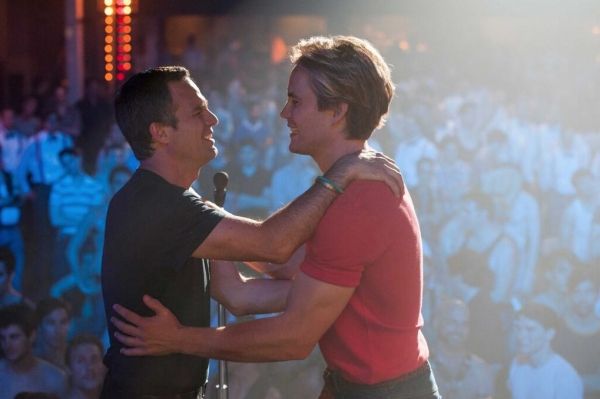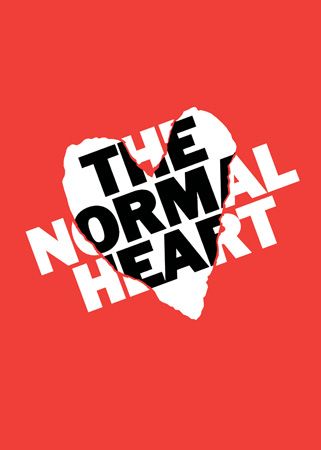Directed by Ryan Murphy and written by Larry Kramer, adapting his groundbreaking Tony Award-winning play of the same name, the HBO original movie The Normal Heart tells the story of the onset of the HIV/AIDS crisis in New York City, in the early 1980s. The film takes an unflinching look at the nation’s sexual politics as gay activists and their allies in the medical community fight to expose the truth about the burgeoning epidemic to a city and nation in denial. Premiering in May, it stars Mark Ruffalo, Julia Roberts, Matt Bomer, Taylor Kitsch and Jim Parsons.
While at the HBO portion of the TCA Press Tour, director/producer Ryan Murphy talked about how close this film is to the original material, that 40 to 45 percent of the material in the movie is brand new, how the issues raised still feel very modern and relevant, that this film looks at an epidemic through the eyes of a love story, how thrilling it is to have two openly gay leading men in the movie, and how content he is to have fully realized his passion project in the way he had dreamed. Check out what he had to say after the jump.
Question: Since the play was so self-contained, how close is this to the original material?
RYAN MURPHY: I think it’s similar to the play, and very different. I really actively pursued the play from Larry [Kramer], and I bought the play in 2010. It was just a passion project of mine. It’s a play that I had loved, even when I was in college. So, I flew myself out and met with him when it became available. He liked my take on it, so he sold it to me. I took out a second mortgage for my home. I worked with Larry on the script for three years, and we broke it out. I would say that there’s probably 40 to 45 percent new material in the movie. He worked really hard on making a really epic story. It takes place from ‘81 to ’84. The first 10 minutes of the movie was all shot on location at Fire Island, at the places where the guys really went and the parties they really went to.
Did you really take out a second mortgage on your house?
MURPHY: I said that figuratively. But, Larry did want a pretty penny for the play.
We now have some answers to the questions being raised in this, whereas at the time this was written, Larry Kramer and a lot of people really thought that this might be a pandemic that could wipe out half the planet. Is there any sort of hindsight, or is it presented in the way it was presented in ‘85?
MURPHY: Well, the movie ends in 1984, right before there actually was even an HIV test. Larry wrote that play with the idea of silence does equal death. When people weren’t writing about it and there were no solutions, he was writing about his community’s experience. The thing that I was very drawn to with the material was that it ends in 1984, but what it’s about feels very modern to me, right now, with gay marriage in the news and people fighting to be loved and accepted for who they are. I feel like it’s still very modern and very applicable to the way we’re living today, and I think that history has proven Larry Kramer to be right. At the time, he was seen as a heretic. I think now, with the passage of time, people look at him as one of the few people who was actually saying and doing the right thing. He said, “We need to pay attention to this. This is going to become a global epidemic,” and indeed it has been. Over 40 million people are dead from HIV/AIDS, and every day, 7,000 people continue to contract HIV.
With time comes perspective, and in the ‘80s, it was really hard to get a perspective on what was happening with the HIV/AIDS crisis. Now that you’re able to look back and recreate that time for HBO, what are the lessons that we can learn? What sort of perspective do you have on what happened back then, and what message do you think this film is going to deliver for people to understand what happened, at that time?
MURPHY: I grew up in this period, and I really came of age in this period. I lost a lot of friends to AIDS, and I can remember one of my best friends, at the time, died in the mid-‘90s. He was fired. His parents ostracized him. He was so stigmatized by it that, even on his death bed, he would not admit that that’s what he was dying of. It was a very painful thing for me, growing up. So, I just really tried to be true to those boys who lost so much, who I feel I owe so much to. I’m married and I have a child. I feel like this movie really is a civil rights movie, and I feel like what those seven guys did, and what Emma did, in that fight really paved the way for the life that I have today. I feel very indebted to them. History shows you that something that probably could have become much less tragic, ballooned into a worldwide epidemic. I feel like the issues that those guys were battling against are exactly the same ones that we’re still fighting against, so it does feel modern, in that the more things change, the more they stay the same. The movie is so sad, and yet it’s hopeful because there are people who were fighting to change the world.
HBO made And the Band Played On, 20 years ago, which was a lot more from the political perspective of things. Are you familiar with that film, and is this the other side of that same story?
MURPHY: I love that movie and, in fact, we have BD Wong in our movie. He was also in that, so I got to spend a lot of time talking to him about the making of that. That was a very important movie, back then. That was a time when a lot of people would not lend their name or their talent or any activity to the cause. I remember seeing people like Richard Gere and Lily Tomlin stepping up, and that was groundbreaking, at the time. That was much more of a scientific film. That was much more of an ensemble, almost like a thriller. This is much more of a love story, and it’s a love story between four people. It’s a love story between Mark [Ruffalo] and Julia [Roberts]. It’s a love story between friends, with Taylor [Kitsch] and Mark. And then, there’s Matt [Bomer] and Mark, and Jim [Parsons] and Mark. And Alfred Molina plays Mark’s brother. We’re looking at an epidemic, as seen through a love story. I think that’s the big difference.
Because this is a period piece, is there a fear that people could just feel like this was a long time ago and that it’s no longer relevant today?
MURPHY: Based on the fact that I have shown the film to a number of young people who are in their early 20s, who are gay and who had no knowledge of what they stand on the shoulders of, a generation before them, I can see that it’s relevant. My interest in it is to raise awareness, but I think it’s just such a great story. It’s almost Shakespearean, in its highs and lows, which is what I was attracted to with it. So, it is a period piece, but it is still so modern. When Larry did the play, it ended with Dr. Emma doing a wedding between Matt and Mark’s characters, which was very radical, at the time. This movie is about people fighting for love and wanting to be treated equally, and that that is an incredibly modern idea. We read about it, every day.
When you were first dreaming of bringing this to screen, could you ever have imagined that you would be able to cast two openly gay leading men in the movie?
MURPHY: I do think that the world has changed so much, even in the past five years that I have been working on the material with Larry. It’s really thrilling. I don’t think of actors as gay or straight. I think of them as great actors. I never went after anybody based on their sexuality. I went after who I thought would be the best actor for the part, and the people that I thought would bring the most commitment and nuance to it. But, I do feel like the world is changing. If you look at Matt and Jim, I think that it’s a very different ball game that we’re in, and it was such a privilege for me to work on it. I felt very honored that Larry would entrust me with it. I think he got that I would not stop until it was made, and it was his lifelong dream. He had been working on it for 30 years, and he had so many wonderful people, through the ages, attached to it. I also worked with Larry very closely on the casting, and with Mark and with Julia. As a collective, we really went after people that we thought would just be incredibly committed in the roles, and that’s what we got.
Is there anything else right now that you would like to develop?
MURPHY: No. I have been working on this for a really long time. We literally finished shooting it in November. It airs in May. I just really feel great about the work that we did, and I really love Larry and his commitment to the material. I love that with this, as in life, he never gave up. So, I’m very content to just be where I am, and continue to put my passion into the wrapping up of this project.
The Normal Heart premieres on HBO in May.


